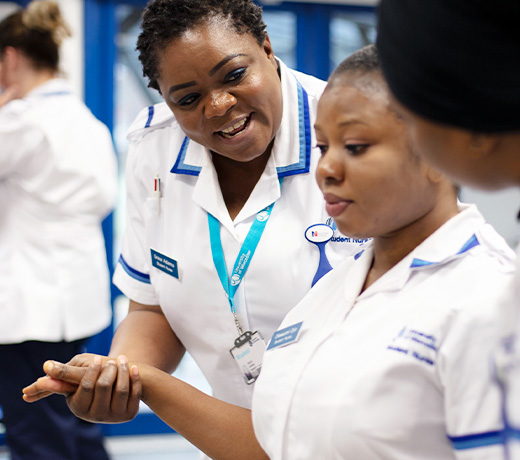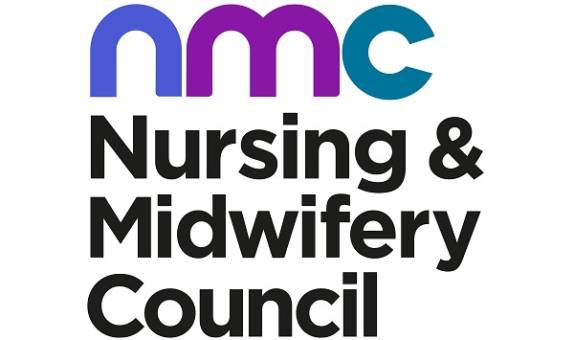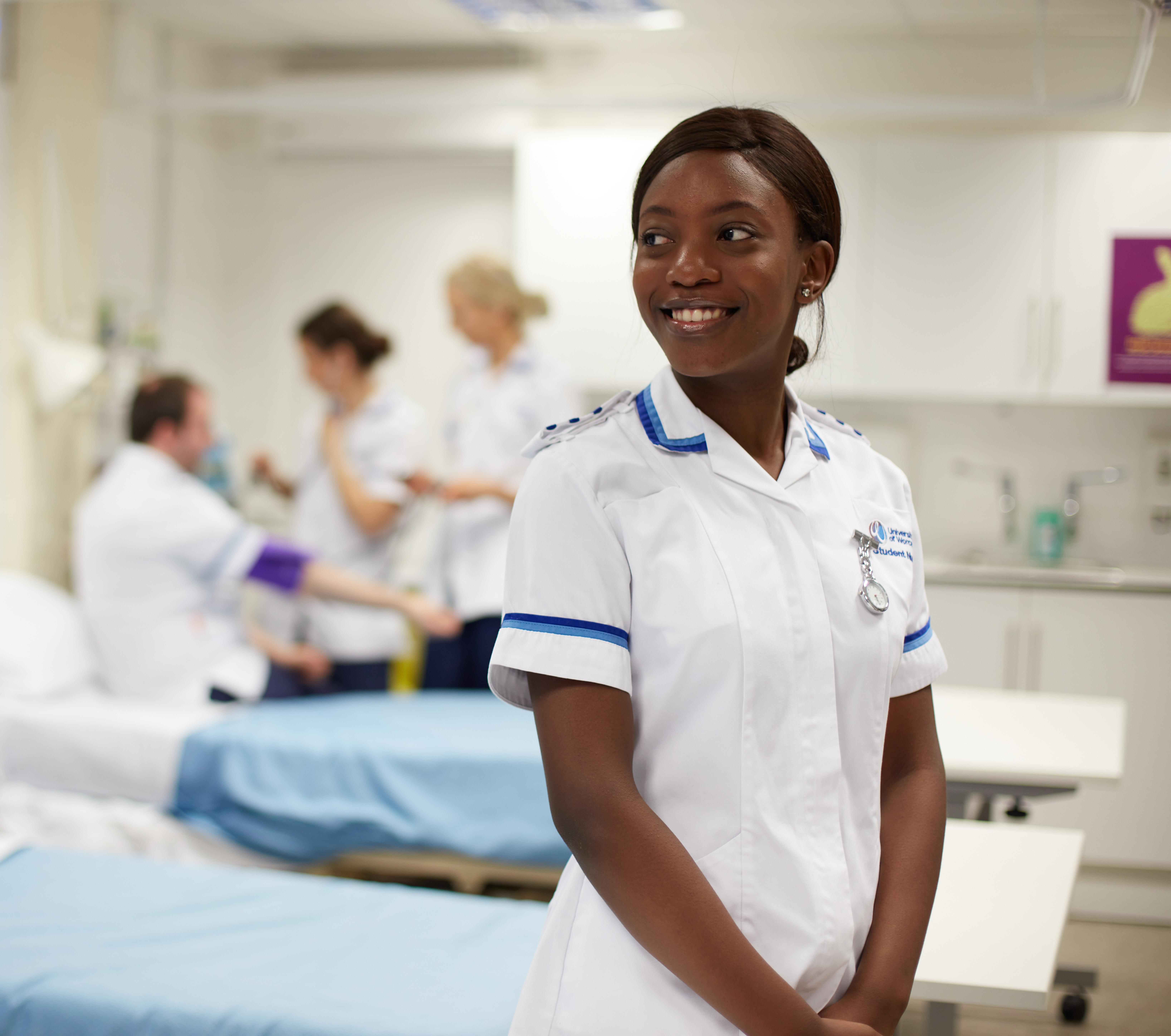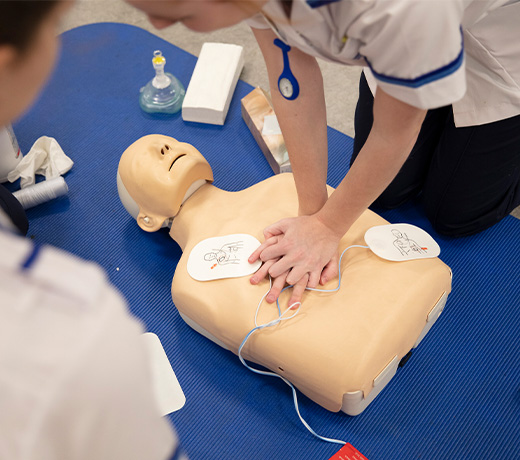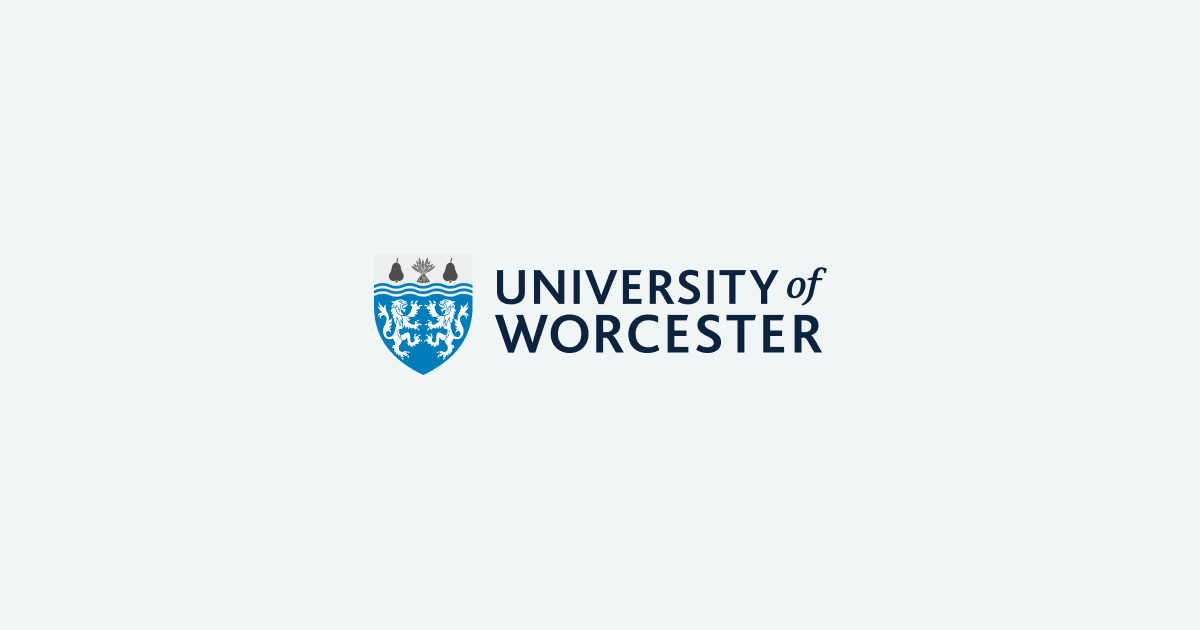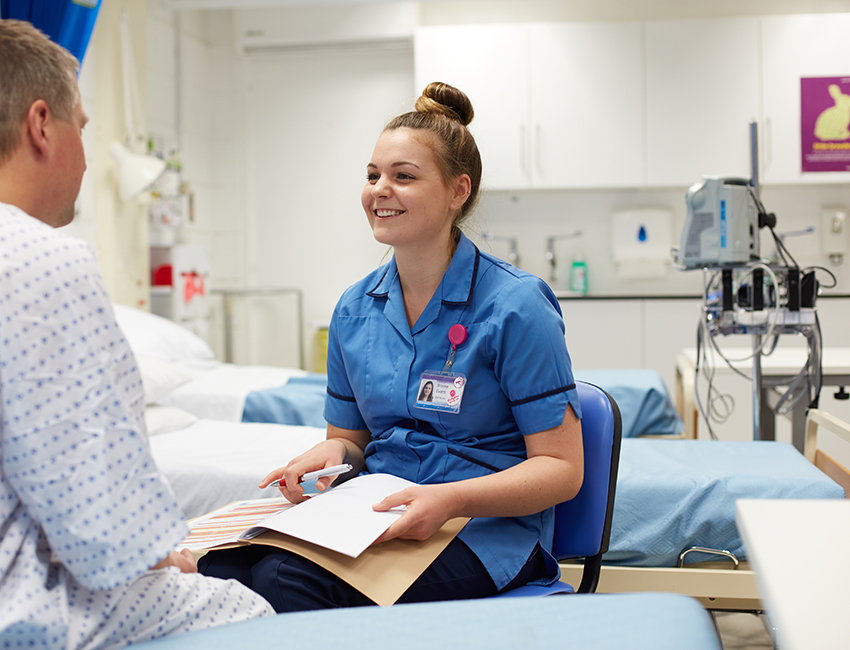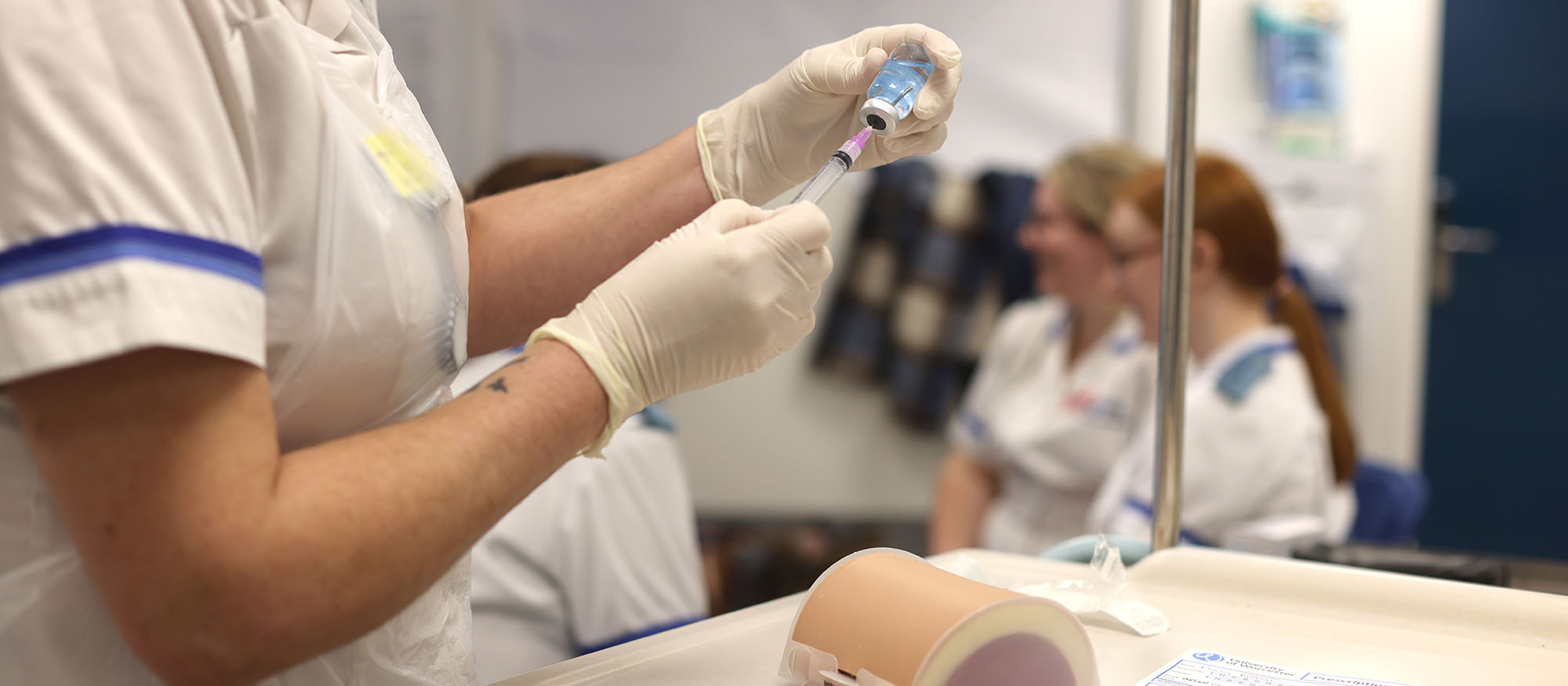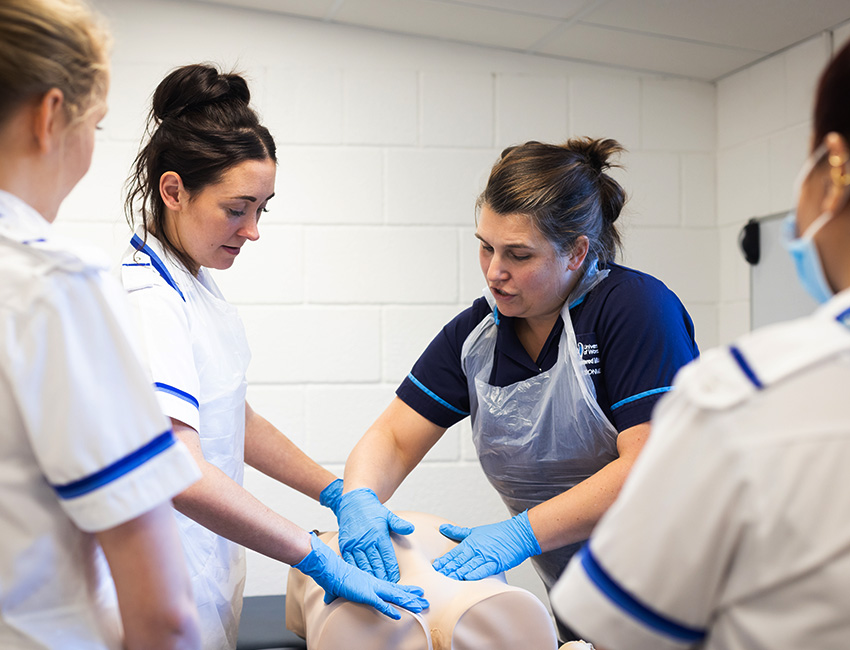The foundation year will prepare you to study nursing by building on your health care, science, and research knowledge. During the foundation year, you will study with students preparing for a range of healthcare courses, including paramedicine, physiotherapy and diagnostic radiography. Successful completion of the foundation year will guarantee your progression to our three-year Mental Health Nursing degree.
The final three years of this course are accredited by the Nursing and Midwifery Council (NMC)
Once you graduate with Mental Health Nursing (BSc), you’ll be eligible to register as a nurse with the NMC, the professional regulatory body for nurses.
University of the Year finalist
Recognised for our graduate success, we’re shortlisted for University of the Year in the Times Higher Education Awards 2025.
Overview
Your first year will build up your knowledge of the fundamentals of human anatomy and the core principles of care, where you will learn and collaborate with students of other healthcare professions. With a focus on key study skills and techniques, the integrated foundation year will ease the transition of studying at degree-level, whether you’re joining us from school, college, or employment.
You’ll learn the theory and put it into practice with hands-on skills and simulation days in the final three years of the course. These sessions take place in our simulation suites which replicate the clinical environment you’ll be working in when you graduate. By working through simulated case studies and clinical scenarios, you’ll have an authentic insight into the role of a mental health nurse and improve your confidence.
To fully prepare you for a career as a mental health nurse, you’ll learn about mental health conditions and how to care for patients of all ages. Learn the best techniques to form relationships and build trust with your patients to help them overcome their challenges and make a difference in their lives.
Your lecturers will get to know you personally. Through tailored support and reflections, they will get to know your strengths and where you can develop. When you start, you’ll be assigned a Personal Academic Tutor, usually this is one of the lecturers teaching your course and they typically remain with you throughout your studies
Placements
There are no placements during the foundation year.
Placement hours are built into the final three years of the course, where your time will be split between learning on campus and developing your skills on placements across the Midlands. Your placements will run in blocks across the year, normally with experiences in at least two different placement settings each year.
These settings could include:
- Nursing homes
- Psychosis services
- Prison services
- Dementia services
- Child and adolescent mental health services
- Psychiatric intensive care
While out on placement you’ll learn from experienced nurses and have the support of your tutors. These practical experiences, in combination with your time on campus, prepare you to be a skilled, compassionate, and confident mental health nurse.
Upcoming events
Course content
During the foundation year, you’ll study theories backed up by substantial evidence and apply these to healthcare and the nursing profession.
We regularly review our courses to reflect the latest research and developments in the subject area, as well as feedback from students, employers and the wider sector. As a result, modules may change to ensure the course remains current and relevant.
All modules are mandatory to ensure you’re eligible to progress to the Mental Health Nursing BSc course.
Careers
This course will prepare you for registration with the Nursing and Midwifery Council, so you can begin a rewarding career in mental health nursing.
Most of our graduates go on to work in the NHS – but others find positions in private practices, social services, schools, or choose to work overseas.
In your final year, we arrange mock interviews and CV writing workshops, and your personal academic tutor will help you to plan your career. We also invite employers in the region onto campus to meet you and discuss career opportunities.
Opportunities
Once you’ve qualified as a mental health nurse, you could specialise in working with children or young people as a primary mental health worker, or specialise in a certain area of mental health such as becoming an addiction practitioner.
With future qualifications, you could become an advanced nurse practitioner, clinical nurse specialist or nurse consultant. Or you may want to move into public health, teaching or clinical research.
Course highlights
Teaching and Assessment
The teaching on this course is a mix of interactive seminars, lectures, one-to-one tutorials and practical skills sessions. Your assessments will include presentations, case studies, and written assessments, along with innovative assessment methods including creating a podcast.
Teaching and assessment contents
You will be supported to develop your level of educational attainment while exploring integrated care systems in the 21st Century. The structure of the course will move you towards increasing independence in your studies to successfully engage with Higher Education study, in line with the Framework for Higher Education Qualifications (FHEQ) and University policies for assessment and curriculum design. All modules offer you structured tutor support, and each module is designed to lead you to increasing independence in your confidence.
The learning and teaching strategies of this creative and exciting BSc Nursing with Foundation Year promote active student engagement. The Inclusion Toolkit has been used to develop accessible, flexible and inclusive approaches that empower you to engage with self-directed learning. You will be taught through a combination of interactive workshops, lectures, seminars, clinical skills and simulated learning opportunities, directed study, group projects and self-study packages. Interactive workshops take a variety of formats and are intended to enable the application of learning through discussion and small group activities. Seminars enable the discussion and development of understanding of topics covered in lectures, and practical sessions are focused on identifying subject and/or profession-specific skills and applied knowledge through individual and group project work.
Once you progress on to the BSc Nursing (Mental Health), the core of the nursing programme is learning in a diverse range of clinical placements. Learning in the real world facilitates work-readiness, personal and professional development. Mandatory practice learning equates to 50% of the programme credit for each part, with the programme weeks equally shared between theory and practice learning. Your practice learning is mapped across the programme, gradually increasing as you gain in confidence, with students progressing from 43% of the programme hours in practice learning environments in part one, to 55% in part three, supporting your transition from student to Registered Nurse. Student placements run in blocks across each part, with experiences normally in a minimum of two practice placements per part, in a setting appropriate to their field of practice. The use of ‘spokes’ (visits to alternative placement settings) to maximise learning opportunities offered by diverse and non-traditional settings, offer exposure to opportunities to care for people from across the life-span, with mental and physical health needs and learning disabilities. Enhanced practice learning days rooted in clinical practice, provide opportunities to consolidate learning, and for reflection and inter-professional learning, including added value learning experiences and seeking additional support as necessary to promote inclusive learning in the practice setting.
Students on placement are supernumerary and are supported by a practice supervisor and assessed by a practice assessor, both having undergone appropriate preparation for their roles. Students will have access to the internet and library resources whilst on placement.
You will be provided with opportunity to complete simulated practice learning activities. All simulated activities involve a range of people including students, peers, service users/carers, practitioners, technicians, academics and includes role play, ‘hands on’ practical skills sessions using a range of simulation manikins, video recording and playback. Formative feedback on performance is provided to facilitate safe and effective support for essential skills development, in simulation suites, replicating hospital and community practice learning environments. This learning is particularly important in part one, with 20 days allocated to prepare students for their practice learning experiences. This is reduced in part two and three to 10 days per part.
You will have the opportunity to complete a UK or international elective placement, during part three, semester one. This can be either a formative four-week experience or a summative experience, between 6 and 12 weeks, helping with the globalization of the programme and employability.
The University places emphasis on enabling you to develop independent learning capabilities that will equip you for lifelong learning and future employment, as well as academic achievement. A mixture of independent study, teaching and academic support from Student Services and Library Services, as well as the Personal Academic Tutoring system will enable you to reflect on progress and build up a profile of skills, achievements and experiences that will help you to flourish and be successful.
Meet the team
Entry requirements
UCAS tariff points required: 32
The UCAS tariff points can come from 1 A-level (grade C or above) or an equivalent qualification. You will also need:
- GCSE English and Mathematics at grade C/4 or above
- A clear commitment to pursuing a career in nursing
- To be at least 18 years old
The BSc Nursing (Adult) with Foundation Year course is aimed at individuals who may have few or no relevant formal qualifications but who can demonstrate a clear commitment to pursuing a career in nursing. Personal, professional, and educational experiences will be considered to determine motivation and ability to progress onto the degree course. Applicants who do not meet the minimum UCAS points requirement will be required to demonstrate and provide evidence of working in a healthcare setting and complete a written assignment task to assess their readiness for the course.
Any questions?
If you have any questions about entry requirements, please call our Admissions Office on 01905 855111 or email admissions@worc.ac.uk.
Fees
Fees contents
UK and EU students
In 2026/27 the standard fee for full-time home and EU undergraduate students on BA/BSc/LLB degrees and FdA/FdSc degrees is £9,790 per year.
Tuition fees are reviewed annually and may increase each year for both new and continuing students.
For more details on course fees, please visit our course fees page.
International students
In 2026/27 the standard tuition fee for full-time international students enrolling on BA/BSc/LLB degrees and FdA/FdSc degrees is £17,200 per year.
Tuition fees are reviewed annually and may increase each year for both new and continuing students.
For more details on course fees, please visit our course fees page.
How to apply
How to apply contents
Applying through UCAS
UCAS is the central organisation through which applications are processed for full-time undergraduate courses in the UK.
Read our how to apply pages for more information on the application process, or if you’d like to apply for part-time study.
Contact
If you have any questions, please get in touch. We're here to help you every step of the way.

Jodie Walker-Haywood
nursingadmissions@worc.ac.ukAdmissions Office
admissions@worc.ac.uk01905 855111More to explore
Open Days
Visiting us is the best way to get a feel for student life at the University of Worcester.

The City of Worcester
Worcester is a welcoming university city with great transport links and plenty of student parking.

Accommodation
Benefit from our accommodation guarantee. We have rooms on campus to suit every budget including en-suite options.

